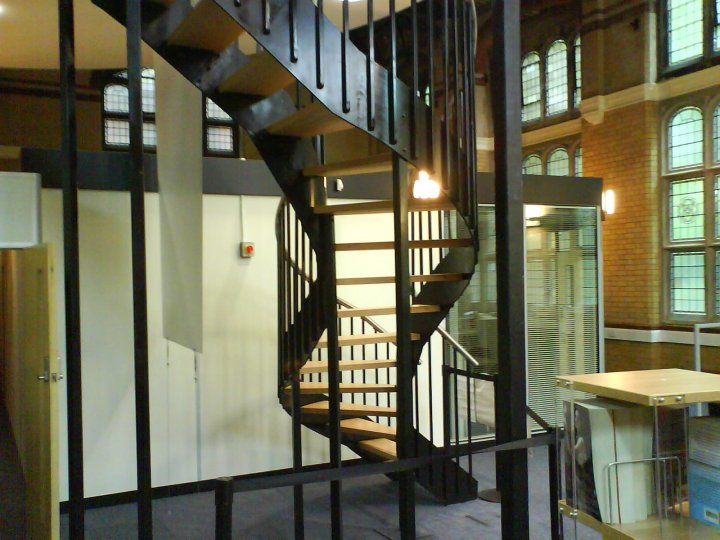Spiral staircases for homes
A property of more than one level will of course need stairs, and one way of connecting the two storeys of a home is with a spiral staircase design.
A traditional house in the UK will generally have a staircase leading from the front door and the front hallway to the upper level of the home; this is extremely common but can be boring and plain. Wooden stairs with carpet are not just plain however; they take up unnecessary space.
A spiral staircase design will create a feeling of light, will take up less space than traditional stairs, and will create a focal point in the home. There can be something quite magical about owning a spiral staircase, perhaps because spiraling stairs are often featured in fairytales, or perhaps because of the intricate design on the spindles; whatever the reason, a spiral staircase can bring an air of grace and magic.
Spiral stair kits are available at very reasonable prices, and in different lengths, meaning it is possible to choose a length and steepness of stairs suited to almost any home. There are however some decisions to make, and these begin with the material that will be used. In a modern home it is common to see floating stairs with glass panelling; in a traditional home wrought iron spindles and a wooden baluster are common.
With the possibility to create a staircase with wrought iron, wood, glass, or other metals, a spiral staircase and its intricate curves will allow stairs to become a focal point of attention, creating the perfect ambience whether traditional or modern.
--Classic Ironworks 12:59, 5 June 2015 (BST)
[edit] Find out more
[edit] Related articles on Designing Buildings Wiki
Featured articles and news
A case study and a warning to would-be developers
Creating four dwellings for people to come home to... after half a century of doing this job, why, oh why, is it so difficult?
Reform of the fire engineering profession
Fire Engineers Advisory Panel: Authoritative Statement, reactions and next steps.
Restoration and renewal of the Palace of Westminster
A complex project of cultural significance from full decant to EMI, opportunities and a potential a way forward.
Apprenticeships and the responsibility we share
Perspectives from the CIOB President as National Apprentice Week comes to a close.
The first line of defence against rain, wind and snow.
Building Safety recap January, 2026
What we missed at the end of last year, and at the start of this...
National Apprenticeship Week 2026, 9-15 Feb
Shining a light on the positive impacts for businesses, their apprentices and the wider economy alike.
Applications and benefits of acoustic flooring
From commercial to retail.
From solid to sprung and ribbed to raised.
Strengthening industry collaboration in Hong Kong
Hong Kong Institute of Construction and The Chartered Institute of Building sign Memorandum of Understanding.
A detailed description from the experts at Cornish Lime.
IHBC planning for growth with corporate plan development
Grow with the Institute by volunteering and CP25 consultation.
Connecting ambition and action for designers and specifiers.
Electrical skills gap deepens as apprenticeship starts fall despite surging demand says ECA.
Built environment bodies deepen joint action on EDI
B.E.Inclusive initiative agree next phase of joint equity, diversity and inclusion (EDI) action plan.
Recognising culture as key to sustainable economic growth
Creative UK Provocation paper: Culture as Growth Infrastructure.
Futurebuild and UK Construction Week London Unite
Creating the UK’s Built Environment Super Event and over 25 other key partnerships.
Welsh and Scottish 2026 elections
Manifestos for the built environment for upcoming same May day elections.
Advancing BIM education with a competency framework
“We don’t need people who can just draw in 3D. We need people who can think in data.”

























